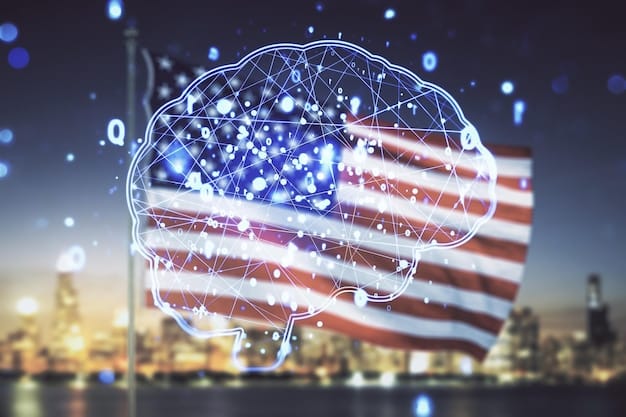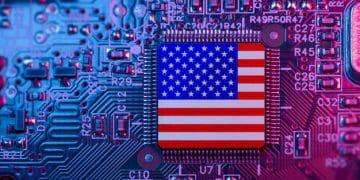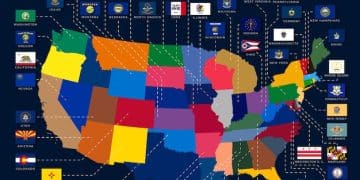US AI Policy: International Standards and Ethical Considerations

US policy on artificial intelligence (AI) navigates a complex landscape, balancing innovation with ethical considerations and the need to align with evolving international standards to ensure responsible development and deployment.
The US Policy on Artificial Intelligence: How Does It Align with International Standards and What Are the Ethical Considerations? is a multifaceted issue requiring careful consideration of technological advancements, societal impacts, and global cooperation. This article explores the key aspects of this policy, examining its alignment with international norms and the ethical dilemmas it presents.
Understanding the US Policy on Artificial Intelligence
The US approach to artificial intelligence policy is characterized by a blend of promoting innovation and addressing potential risks. It involves various government agencies, academic institutions, and private sector stakeholders working to shape the future of AI development and deployment.
Key Goals of US AI Policy
The overarching goals of the US AI policy include bolstering economic competitiveness, enhancing national security, and protecting civil rights and liberties in the age of AI.
- Supporting AI research and development to maintain a leading position in the global AI landscape.
- Promoting the use of AI in various sectors, such as healthcare, transportation, and education, to improve efficiency, productivity, and overall societal well-being.
- Establishing ethical guidelines and standards for AI development and deployment to prevent bias, discrimination, and other unintended consequences.
- Fostering international collaboration to address global challenges related to AI and ensure that AI technologies are used responsibly and ethically.
The US government has launched several initiatives to advance these goals, including the establishment of the National AI Initiative Office and the development of AI risk management frameworks.

Alignment with International Standards
The US is actively engaged in international efforts to develop common standards and principles for AI governance. This engagement is crucial for ensuring that AI technologies are developed and used in a way that is consistent with shared values and norms.
Participation in International Forums
The US participates in various international forums, such as the G7, the OECD, and the UN, to discuss AI-related issues and contribute to the development of international standards.
These forums provide platforms for sharing best practices, identifying common challenges, and exploring potential solutions.
Comparison with Other Nations’ Approaches
While the US emphasizes innovation and a light-touch regulatory approach, other countries, such as the European Union, have adopted more stringent regulatory frameworks for AI. Understanding these differences is essential for fostering international cooperation and ensuring that AI technologies are used responsibly on a global scale.
- The EU’s approach focuses on establishing a comprehensive regulatory framework that addresses a wide range of AI-related risks.
- China’s strategy involves heavy government involvement and the use of AI to advance national interests.
- Other countries, such as Canada and Singapore, are developing their own unique approaches that balance innovation with ethical considerations.
The US seeks to strike a balance between promoting innovation and ensuring that AI aligns with international standards and ethical principles.
Ethical Considerations in US AI Policy
Ethical considerations are at the forefront of US AI policy discussions, as AI technologies have the potential to raise significant ethical dilemmas related to bias, fairness, transparency, and accountability.

Addressing Bias and Discrimination
AI algorithms can perpetuate and amplify biases present in the data they are trained on, leading to discriminatory outcomes. The US government is working to address this issue by promoting the development of fair and unbiased AI technologies.
Efforts include promoting the use of diverse datasets, developing methods for detecting and mitigating bias, and establishing standards for AI fairness.
Ensuring Transparency and Accountability
Transparency and accountability are crucial for building trust in AI systems. The US government is encouraging the development of AI technologies that are transparent, explainable, and subject to oversight.
This involves promoting the use of explainable AI (XAI) techniques, establishing mechanisms for auditing AI systems, and holding developers and deployers accountable for the consequences of their AI technologies.
Protecting Privacy and Civil Liberties
AI technologies have the potential to infringe on privacy and civil liberties. The US government is working to protect these rights by establishing safeguards for the collection, use, and sharing of personal data in AI systems.
- Implementing data privacy laws and regulations that limit the collection and use of personal data.
- Promoting the use of privacy-enhancing technologies (PETs) that allow data to be used without revealing the underlying information.
- Establishing oversight mechanisms to ensure that AI systems are used in a way that respects privacy and civil liberties.
These ethical considerations are essential for guiding the responsible development and deployment of AI technologies in the US.
The Role of Regulation and Legislation
Regulation and legislation play a crucial role in shaping US AI policy. While the US has traditionally favored a light-touch regulatory approach, there is growing recognition of the need for more specific rules and laws to address AI-related risks.
Current Regulatory Landscape
The current regulatory landscape for AI in the US is fragmented, with different agencies responsible for regulating different aspects of AI. This can create uncertainty and confusion for businesses and consumers.
However, several agencies have taken steps to address AI-related risks, including the Federal Trade Commission (FTC), the Equal Employment Opportunity Commission (EEOC), and the Consumer Financial Protection Bureau (CFPB).
Potential for New Legislation
There is growing support for new legislation to address AI-related issues, such as data privacy, algorithmic bias, and AI safety. Several bills have been introduced in Congress that would establish new rules and standards for AI.
The passage of such legislation could have a significant impact on the development and deployment of AI technologies in the US.
Industry Self-Regulation
In addition to government regulation, industry self-regulation also plays a role in shaping AI policy. Many companies are developing their own ethical guidelines and best practices for AI development and deployment.
- Establishing AI ethics boards and committees to oversee AI development and deployment.
- Developing AI risk management frameworks to identify and mitigate potential risks.
- Promoting transparency and explainability in AI systems.
Industry self-regulation can help to ensure that AI technologies are used responsibly and ethically.
Challenges and Opportunities
The US faces several challenges and opportunities in shaping its AI policy. These include balancing innovation with regulation, addressing ethical concerns, and fostering international cooperation.
Balancing Innovation and Regulation
One of the key challenges is to strike a balance between promoting innovation and ensuring that AI is used responsibly. Overly strict regulations could stifle innovation, while insufficient regulation could lead to unintended consequences.
The US needs to find a way to foster innovation while also addressing potential risks.
Addressing Ethical Concerns
Addressing ethical concerns, such as bias, fairness, transparency, and accountability, is also a major challenge. AI technologies have the potential to raise significant ethical dilemmas, and it is important to ensure that these issues are addressed proactively.
Fostering International Cooperation
Fostering international cooperation is essential for addressing global challenges related to AI. AI technologies are being developed and used around the world, and it is important to ensure that they are used in a way that is consistent with shared values and norms.
The US needs to work with other countries to develop common standards and principles for AI governance.
Economic Growth and Job Creation
AI has the potential to drive economic growth and create new jobs. The US needs to ensure that its AI policy supports these opportunities while also addressing potential risks, such as job displacement and inequality.
Investing in education and training programs to prepare workers for the AI-driven economy is crucial.
Future Directions for US AI Policy
The future of US AI policy is likely to be shaped by several factors, including technological advancements, societal changes, and international developments. The US needs to adapt its policies to keep pace with these changes and ensure that AI is used in a way that benefits society.
Investing in AI Research and Development
Continued investment in AI research and development is essential for maintaining a leading position in the global AI landscape. The US government should continue to support AI research at universities, national laboratories, and private companies.
Developing AI Education and Training Programs
Developing AI education and training programs is crucial for preparing the workforce for the AI-driven economy. The US needs to invest in programs that teach students and workers the skills they need to succeed in the age of AI.
Establishing Clear Ethical Guidelines and Standards
Establishing clear ethical guidelines and standards for AI development and deployment is essential for ensuring that AI is used responsibly and ethically. The US government should work with stakeholders to develop these standards and ensure that they are enforced.
Promoting International Collaboration
Promoting international collaboration is crucial for addressing global challenges related to AI. The US should continue to work with other countries to develop common standards and principles for AI governance.
These future directions will help to ensure that AI is used in a way that benefits society and aligns with US values.
| Key Area | Brief Description |
|---|---|
| 🚀 Innovation | Focus on supporting AI R&D to boost economic competitiveness. |
| 🛡️ Ethics | Addressing bias, ensuring transparency, and protecting privacy. |
| 🌍 International Standards | Alignment with global norms and participation in international forums. |
| ⚖️ Regulation | Balancing light-touch approach with specific rules for AI risks. |
FAQ
▼
The main goals include boosting economic competitiveness, enhancing national security, and protecting civil rights in the age of AI.
▼
The US participates in international forums like the G7 and OECD to discuss AI issues and develop common principles.
▼
Ethical considerations include addressing bias and discrimination, ensuring transparency, and protecting privacy and civil liberties.
▼
Regulation plays a crucial role, balancing a light-touch approach with specific rules to address AI-related risks and ensure responsible use.
▼
Future directions include investing in AI research, developing AI education programs, and promoting international collaboration to ensure its ethical use.
Conclusion
In conclusion, the US policy on artificial intelligence reflects an ongoing effort to balance innovation, ethical considerations, and international standards. By addressing key challenges and embracing future opportunities, the US can help ensure that AI is used in a way that benefits society and aligns with its values.





